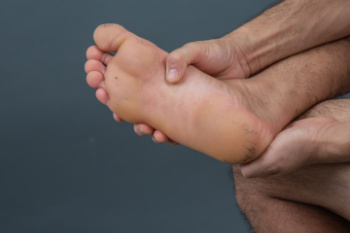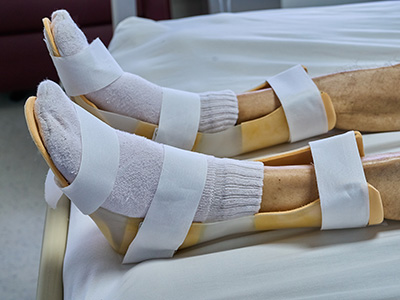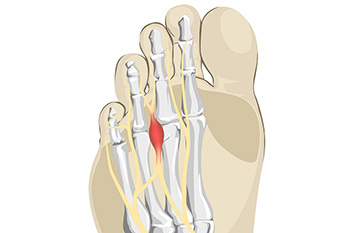
(908) 381-8160Berkeley Heights

Cracked heels, also known as fissures, are a common foot condition where the skin on the heels becomes dry, thickened, and eventually splits. These cracks can be painful and, in severe cases, may lead to infection. The primary causes of cracked heels include dry skin, prolonged standing, excessive pressure on the feet, and wearing open-back shoes. To find relief, it is important to keep the feet moisturized with thick creams or ointments that help heal and hydrate the skin. Regular exfoliation with a pumice stone can remove dead skin and prevent the buildup that leads to cracks. Wearing comfortable, supportive shoes with proper cushioning can also reduce pressure on the heels. If you have developed persistent cracked heels, it is suggested that you consult a podiatrist who can offer prescribed medication for effective relief and treatment.
If the skin on your feet starts to crack, you may want to see a podiatrist to find treatment. If you have any concerns, contact Dr. Janet Leicht from New Jersey. Our doctor can provide the care you need to keep you pain-free and on your feet.
Cracked Heels
It is important to moisturize your cracked heels in order to prevent pain, bleeding, and infection. The reason cracked heels form is because the skin on the foot is too dry to support the immense pressure placed on them. When the foot expands, the dry skin on the foot begins to split.
Ways to Help Heal Them
Ways to Prevent Cracked Heels
If you are unsure how to proceed in treating cracked heels, seek guidance from a podiatrist. Your doctor will help you with any questions or information you may need.
If you have any questions, please feel free to contact our office located in Berkeley Heights, NJ . We offer the newest diagnostic and treatment technologies for all your foot care needs.

Plantar fasciitis can cause significant discomfort, and using orthotics and dorsal night splints offers effective relief. Orthotics provide customized support to the arch of the foot, helping to distribute pressure evenly and reduce strain on the plantar fascia. They can alleviate pain during daily activities and improve overall foot alignment. Dorsal night splints are designed to keep the foot in a gentle, extended position while sleeping, which helps to stretch the plantar fascia and Achilles tendon. This continuous gentle stretch can significantly reduce morning pain and stiffness. These interventions work together to promote healing, enhance comfort, and reduce persistent foot pain. Incorporating orthotics and dorsal night splints into a treatment plan can lead to improved mobility and a better quality of life for those affected by plantar fasciitis. If you are suffering from plantar fasciitis, it is strongly suggested that you consult a podiatrist who can determine if this type of orthotic is right for you.
If you are having discomfort in your feet and would like to try orthotics, contact Dr. Janet Leicht from New Jersey. Our doctor can provide the care you need to keep you pain-free and on your feet.
What Are Orthotics?
Orthotics are inserts you can place into your shoes to help with a variety of foot problems such as flat feet or foot pain. Orthotics provide relief and comfort for minor foot and heel pain but can’t correct serious biomechanical problems in your feet.
Over-the-Counter Inserts
Orthotics come in a wide variety of over-the-counter inserts that are used to treat foot pain, heel pain, and minor problems. For example, arch supports can be inserted into your shoes to help correct overarched or flat feet, while gel insoles are often used because they provide comfort and relief from foot and heel pain by alleviating pressure.
Prescription Orthotics
If over-the-counter inserts don’t work for you or if you have a more severe foot concern, it is possible to have your podiatrist prescribe custom orthotics. These high-quality inserts are designed to treat problems such as abnormal motion, plantar fasciitis, and severe forms of heel pain. They can even be used to help patients suffering from diabetes by treating foot ulcers and painful calluses and are usually molded to your feet individually, which allows them to provide full support and comfort.
If you are experiencing minor to severe foot or heel pain, it’s recommended to speak with your podiatrist about the possibilities of using orthotics. A podiatrist can determine which type of orthotic is right for you and allow you to take the first steps towards being pain-free.
If you have any questions please contact our office located in Berkeley Heights, NJ . We offer the newest diagnostic and treatment technologies for all your foot and ankle needs.

Morton's neuroma is a painful condition that occurs when a nerve in the foot becomes compressed or irritated, typically between the third and fourth toes. This condition often results in a sharp, burning pain in the ball of the foot, which may radiate into the toes. Patients commonly describe a sensation of having a pebble in their shoe, along with tingling or numbness in the affected toes. Diagnosing Morton's neuroma involves a thorough physical examination by a podiatrist, who may assess foot structure and check for tenderness in the affected area. Imaging tests, such as ultrasound or MRI scans, may be used to confirm the diagnosis and rule out other conditions. If you are experiencing symptoms of Morton’s neuroma, it is suggested that you consult a podiatrist who can accurately diagnose and treat this condition.
Morton’s neuroma is a very uncomfortable condition to live with. If you think you have Morton’s neuroma, contact Dr. Janet Leicht of New Jersey. Our doctor will attend to all of your foot care needs and answer any of your related questions.
Morton’s Neuroma
Morton's neuroma is a painful foot condition that commonly affects the areas between the second and third or third and fourth toe, although other areas of the foot are also susceptible. Morton’s neuroma is caused by an inflamed nerve in the foot that is being squeezed and aggravated by surrounding bones.
What Increases the Chances of Having Morton’s Neuroma?
Morton’s neuroma is a very treatable condition. Orthotics and shoe inserts can often be used to alleviate the pain on the forefront of the feet. In more severe cases, corticosteroids can also be prescribed. In order to figure out the best treatment for your neuroma, it’s recommended to seek the care of a podiatrist who can diagnose your condition and provide different treatment options.
If you have any questions, please feel free to contact our office located in Berkeley Heights, NJ . We offer the newest diagnostic and treatment technologies for all your foot care needs.

Ankle pain when walking can have several causes, ranging from injury to underlying medical conditions. Common injuries like sprains or strains occur when ligaments or muscles in the ankle are overstretched or torn, often from twisting or rolling the ankle. Ankle bruising, fractures, or breaks can also result in significant discomfort, especially when weight is placed on the joint. Conditions such as osteoarthritis and gout can lead to chronic ankle pain. Osteoarthritis pain is the result of cartilage breakdown between the bones, while gout is inflammation caused by the buildup of uric acid crystals in the ankle joint. A podiatrist can diagnose the cause of ankle pain and offer appropriate treatment options. If you experience ankle pain when you walk, it is suggested that you schedule an appointment with a podiatrist for an evaluation and treatment.
Ankle pain can be caused by a number of problems and may be potentially serious. If you have ankle pain, consult with Dr. Janet Leicht from New Jersey. Our doctor will assess your condition and provide you with quality foot and ankle treatment.
Ankle pain is any condition that causes pain in the ankle. Due to the fact that the ankle consists of tendons, muscles, bones, and ligaments, ankle pain can come from a number of different conditions.
Causes
The most common causes of ankle pain include:
Symptoms
Symptoms of ankle injury vary based upon the condition. Pain may include general pain and discomfort, swelling, aching, redness, bruising, burning or stabbing sensations, and/or loss of sensation.
Diagnosis
Due to the wide variety of potential causes of ankle pain, podiatrists will utilize a number of different methods to properly diagnose ankle pain. This can include asking for personal and family medical histories and of any recent injuries. Further diagnosis may include sensation tests, a physical examination, and potentially x-rays or other imaging tests.
Treatment
Just as the range of causes varies widely, so do treatments. Some more common treatments are rest, ice packs, keeping pressure off the foot, orthotics and braces, medication for inflammation and pain, and surgery.
If you have any questions, please feel free to contact our office located in Berkeley Heights, NJ . We offer the newest diagnostic and treatment technologies for all your foot care needs.